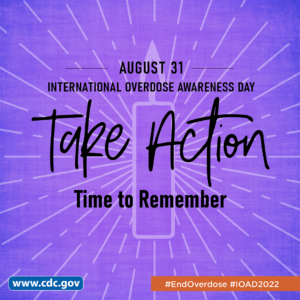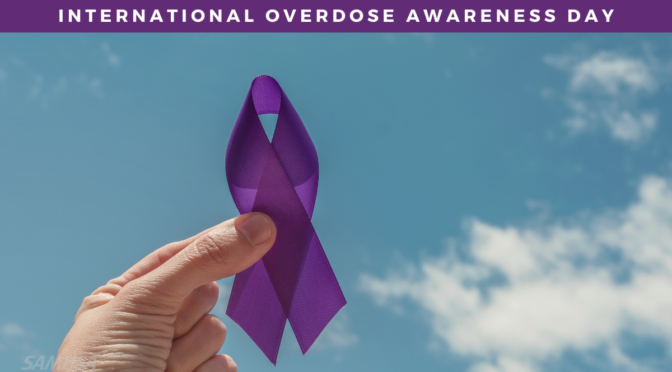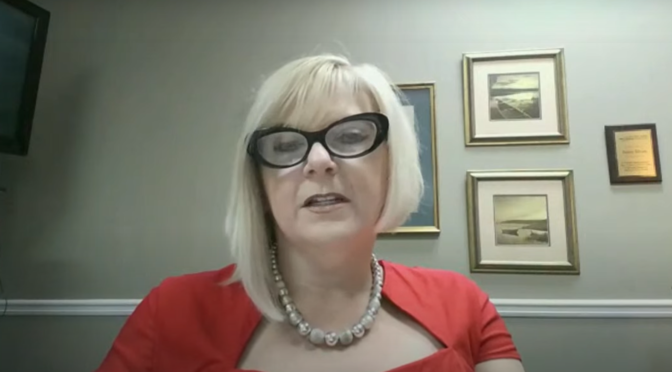August 31 marks International Overdose Awareness Day (IOAD) each year. IOAD is the world’s largest annual campaign to remember those we’ve lost to overdose, acknowledge the grief of the family and friends left behind, and renew our commitment to end overdose and related harms. The campaign spreads the message about the tragedy of drug overdose death and that drug overdose is preventable. The goals of IOAD are:
- To provide an opportunity for people to publicly mourn loved ones.
- To send a strong message to people who use drugs and people in recovery that they are valued.
- To inform people around the world about the risk of drug overdose.
- To provide basic information on the range of support services that are available.
- To prevent and reduce drug-related harm by supporting evidence-based practice.
The White House
On August 26, President Joseph Biden issued A Proclamation on Overdose Awareness Week, 2022 recognizing August 28-September 3, 2022, as Overdose Awareness Week. In the Proclamation, he calls upon “citizens, Government agencies, civil society organizations, healthcare providers, and research institutions to raise awareness of substance use disorder to combat stigmatization, to promote treatment and celebrate recovery, and to strengthen our collective efforts to prevent overdose deaths.”
The Substance Abuse and Mental Health Services Administration (SAMHSA)
CAPT Jeffrey A. Coady, Psy.D., ABPP, Acting Director of the Substance Abuse and Mental Health Services Administration’s (SAMHSA) Center for Substance Abuse Prevention (CSAP) and SAMHSA Region 5 Administrator recognizes IOAD with a new blog post on Preventing Overdose and Death. In the post, Dr. Coady reiterates SAMHSA/CSAP’s commitment to “prevention strategies to prevent or delay the use and misuse of substances, as well as efforts to support States and communities to develop comprehensive prevention programs to educate the public about the dangers of sharing medications, raises awareness among pharmaceutical and medical communities on the risks of overprescribing, and implements overdose death prevention strategies, such as naloxone distribution and the purchase of naloxone for first responders.”
The Centers for Disease Control and Prevention (CDC)
The Centers for Disease Control and Prevention (CDC) Division of Overdose Prevention in the National Center for Injury Prevention and Control is marking IOAD with the release of two new articles, showing the latest trends on drug overdose in the United States.
- A new Morbidity and Mortality Weekly Report (MMWR) analyzes emergency medical services (EMS) data and highlights trends in nonfatal opioid-involved overdoses. This report identifies disparities in overdose rates by patient and county characteristics and provides strategies on what can be done to decrease overdose.
- An up-to-date CDC’s State Unintentional Drug Overdose Reporting System (SUDORS) COVID-19 data brief describes overarching COVID-19-related themes that may have contributed to increased overdose deaths during the start of the COVID-19 pandemic. Based on the identified themes, this brief gives examples of prevention approaches that can be used in future public health emergencies to help reduce overdose deaths.

The Food and Drug Administration (FDA)
The Food and Drug Administration (FDA) recently released the FDA Overdose Prevention Framework. According to the FDA, there are four priorities designed to complement the U.S. Department of Health and Human Services (HHS) Overdose Prevention Strategy and ONDCP’s National Drug Control Strategy. The four priorities within the FDA Overdose Prevention Framework are:
- Supporting primary prevention by eliminating unnecessary initial prescription drug exposure and inappropriate prolonged prescribing.
- Encouraging harm reduction through innovation and education.
- Advancing development of evidence-based treatments for substance use disorders.
- Protecting the public from unapproved, diverted, or counterfeit drugs presenting overdose risks.
To view the Framework, click here. To view FDA’s web page regarding overdose please visit Overdose Prevention.
NASADAD recognizes and thanks all of our Members for their dedication and commitment to reducing overdoses in their State.
For more information about IOAD, visit https://www.overdoseday.com/.

